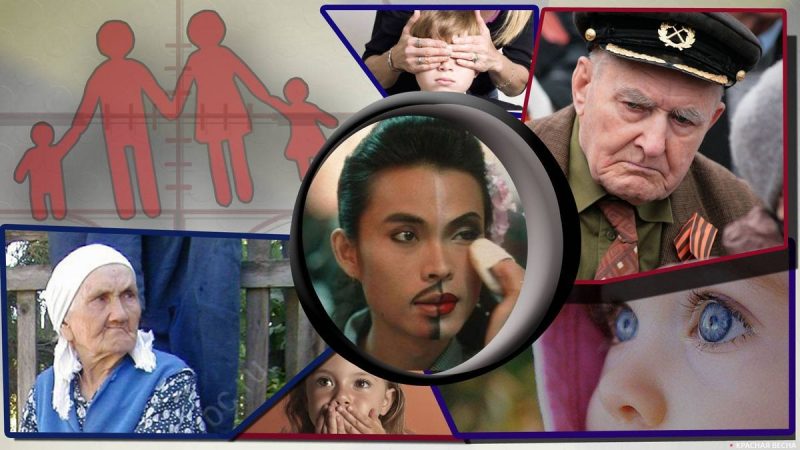19.09.2019, Warsaw.
Prominent international organizations (the UN, Council of Europe, OSCE, etc), which promote gender perspectives, insist on their implementation in all key state institutions.
According to international documents regulating the implementation of gender perspectives, all branches of power (executive, legislative, and judiciary) and all levels of government must be reformed (both federal officials as well as regional and municipal officials must fundamentally reconsider their views and methods of decision making).
Family legislation, cultural, educational, and fiscal policy, social services, and state security services must all be fundamentally restructured.
In our report, we will discuss how the government of one country or another must reformat its security services in accordance with gender-focused legislative norms and approaches, and what consequences these changes may lead to for the state and for society.
The “Gender and Security Sector Reform” toolkit, published by the Office for Democratic Institutions and Human Rights (ODIHR), is one of the important OSCE documents addressing security services reform.
According to this document, security sector reform means the transformation of the security sector, and it “includes all the actors, their roles, responsibilities and actions”. One of its main goals is to “ensure democratic and civilian control” of all security services. How do they intend to exercise this control? We will discuss this below. Please note that the necessity of civilian control over security services is mentioned at least 20 times in this document. Thus, we see that this objective is indeed one of high priority for international institutions promoting gender perspectives.
What central ideas and principles does the gender approach to the national security sector prescribe to?
- Individual rights must be placed above national security interests.
For example, the “Civil Society Oversight of the Security Sector and Gender” toolkit mentions “prioritisation of national security concerns over civil liberties and human rights” (p.2) as among the obstacles that hamper civil society’s control over security agencies. Apparently, in order to achieve better control over security services by civil society, authorities should worry less about national security.
- National security agencies are considered inherently suspect, capable of becoming the enemy of their own people. One can encounter these ideas in multiple documents governing the implementation of the gender approach. Here is a quotation: “Institutions and individuals mandated with the provision of security can at times also be a source of insecurity for the general population, in particular for women and marginalised groups that may face violence at the hands of security forces.” (see: Civil Society Oversight of the Security Sector and Gender). What method is proposed for combating these suspect security services? The next principle addresses this.
- National security agencies need to be monitored by NGOs, and such control will be most effective if it is implemented jointly with international NGOs, especially women’s organizations. (Civil Society Oversight of the Security Sector and Gender).
However, control over security services by women’s and international organizations alone is not enough. Documents on introducing gender approaches in security services also state that…
- NGOs may replace national security agencies. In keeping with this, among the main ways that Civil Society Organizations (CSOs) participate in security sector oversight is “the provision of alternate sources of security and justice in cases where the state is unable and/or unwilling to take on these roles, or where civil society is better-placed to provide such services.” (Civil Society Oversight of the Security Sector and Gender, p.2).
Now let us examine how exactly these principles are implemented in practice.
Tools to reform national security agencies according to the gender approach
- Ideological and cultural impact. One of the most important factors is re-educating security agency personnel in the spirit of loyalty to the gender approach. To serve this purpose, a multitude of gender perspective educational programs have been created for police officers, military personnel, and judges. The “Gender and security sector reform” toolkit criticizes the perception of the soldier as a “real man”. According to the document’s authors, the characteristics of masculinity, loyalty and collectivism are undesirable. The cultivation of such qualities among military personnel is profoundly gender-based, according to the document.
If all of the above listed qualities of a soldier are negative, then what are the positive qualities from the viewpoint of a “proper” gender approach? Obviously, a “proper” soldier is emasculate, disloyal (i.e. able to betray), and incapable of working as part of a team.
The question of whether such a soldier is capable of defending the country in dangerous circumstances is rhetorical.
Furthermore, the translation of ideological positions via mass media is seen as a vital component of implementing gender perspectives. International methodological toolkits assign great importance to establishing international professional associations (for example, associations of judges), whose goal is to change beliefs and existing decision-making practices in accordance with the required ideology.
- The implementation of gender equality mechanisms assumes active participation in the process by non-governmental organizations. Gender ideologues recommend creating a widespread network of women’s NGOs (both on a local and international scale), specializing in various domains of life for the society and the state. Nearly all of the most important documents that regulate this topic insist on the key role of NGOs.
The “Gender mainstreaming in practice” toolkit (published by the UN Development Program Regional Bureau for Europe and the CIS) prescribes to the idea that NGOs must engage in “transforming the institutions and structures (social, political, economic, cultural, etc.) of the policy context, so that full gender equality can be more readily achieved…”[1].
These NGOs become one of the main mechanisms of influence and the main factor for reformating state institutions. What specific functions must NGOs perform in implementing the gender approach?
A) Perform data collection regarding the nation’s citizens, on how security services function, on resource distribution, etc. The list is open and limitless. The methodological toolkits for gender equality implementation recommend that NGOs carefully monitor and collect data on how fairly resources are allocated and “monitor and evaluate security policies and programmes by their specific impact upon men, women, girls and boys.” (Civil Society Oversight of the Security Sector and Gender, p.7)
B) Achieve changes in national legislation. The methodological toolkits on implementing gender approaches recommend that activists from women’s NGOs become experts and influence changes in legislation through providing expert opinions and consultations to political figures, the government, lawmakers, and officials. They also recommend creating and lobbying laws governing the implementation of gender approaches.
C) Act as an intermediary between the authorities and society. The “Gender and Security Sector Reform” toolkit states that women’s NGOs are one of the chief institutions of civil oversight. “As such, women’s organisations can serve as crucial bridges between local communities and security policymakers, strengthening local ownership”, the toolkit reads.
However, it turns out in actuality that these women’s NGOs often 1) receive financing from foreign structures and funds, 2) promote the policies of people with vested interests — their donors, 3) intervene in their countries’ political lives in domains that are unrelated to gender issues, 4) promote not building bridges between the authorities and local communities, but increasing tensions between them, and 5) they try to take the place of the authorities.
Let us offer an example. Key women’s NGOs in Russia (including the Moscow Center for Gender Studies (MCGS), the Information Center of the Independent Women’s Forum (IWF), the Consortium of Women’s NGOs (CWN), and the “Anna” Center) are in close ties with the foreign funds that finance them, including the US Department of State. Activists from these women’s NGOs, who began their social activism with protecting women’s rights, became participants in mass rioting and took part in illegal demonstrations demanding that the authorities be overthrown.
D) Exercise oversight over state institutions. Let us present an example of when an attempt to establish such oversight was undertaken in Russia. The federal legislative bill on state guarantees of equal rights between men and women (“On state guarantees of equal rights and freedoms for men and women and opportunities for their realization in the Russian Federation”, bill № 284965-3), which the press named “the gender equality law”, was presented before the Russian parliament. The law proposed implementing gender-focused appraisals of all legislative bills introduced in the country, as well as “support for studies focusing on gender discrimination and achieving gender equality.”
The bill also provided for broad support to NGOs working on gender equality issues. The bill’s authors probably implemented recommendations contained in international documents. According to these documents, conducting so-called “gender-focused appraisals” must be applied to all legislative acts, initiatives, and projects implemented by all branches and levels of government. In essence, such requirements incorporate provisions giving gender ideologues control over the entire body of national legislation, and making it compatible with gender approaches. Currently, the bill has been withdrawn, but we have no doubt that attempts to push such bills through will continue.
The necessity of analyzing all initiatives and projects provides these gender experts with access to any information they need. For example, the “Gender Mainstreaming in Practice” toolkit instructs how to collect information, for the purpose of gender analysis, about the activities of law-enforcement agencies, to test and retrain personnel, and also to monitor their decision-making for compliance with gender equality. The necessity to conduct appraisals and studies forces officials to report to gender NGOs. This, according to international expert opinion, “will be a key strength for municipalities to highlight when applying for loans and structural funds from major donors such as the United Nations and European Union bodies, who place great emphasis on attention to gender mainstreaming in their review of projects and funding applications” [1]. In essence, we see monitoring and oversight by international structures of all national government institutions being implemented by way of gender mainstreaming.
Oversight of state services, and particularly the security sector, is proposed through creating of special committees within these agencies. The committees, which must include gender experts, are to control the proper allocation of the military budget and provision for other military needs. It is important to note that, according to authors’ opinion, one of the obstacles to gender mainstreaming are “overresourced armed forces”. Apparently, one of the gender experts’ tasks is to free the armed forces of armaments.
E) Replace state institutions.
In Russia, the process of replacing government institutions by CSOs has only begun. This consists of creating a wide spectrum of so-called socially oriented NGOs, which have already started to perform the functions of social services. These NGOs often have foreign funding, or they have been created through the initiative of foreign citizens, and now receive state funding, but they receive oversight from international structures. They serve the functions of creating centers for children, who have been seized from their parents. The infrastructure of such centers resembles that of juvenile detention facilities. Locked doors, barred windows, custody guards. These same women’s NGOs engage in matching foster guardians with orphan children. At this moment, a network of women’s shelters is being created in Russia with assistance of women’s NGOs. A strange PR campaign accompanies the creation of crisis centers for women. A number of women’s NGOs provide media, government officials, and elected deputies with data on family violence which exceed the real statistics by an order of 1000; and consequently, they paint a picture of Russian families as extremely dysfunctional, which has nothing to do with reality.
As we have seen in other countries, parallel justice systems under the control of international structures are being created as an alternative to those of the state. NGOs serving functions of alternative security agencies also are emerging. As a good example of such an NGO, the Gender and Security Sector Reform toolkit discusses the activity of the Brazilian organization Viva Rio, which deals with disarming street gangs and weapons storage. The organization engages in teaching martial arts and civil activism for women. We can thus see that establishing NGOs with access to criminal elements and weapons, and which teach combat skills to certain groups of the population is being encouraged. What direction such “civil” activity may be steered toward is an open question.
- Ideologically trained activists introduction into all institutions of power
Usually, this process takes place according the following scheme. NGOs or charitable foundations offer certain projects to the authorities for implementation that are aimed at addressing a societal problem in its gender aspect. Financial support at the first stage is carried out by NGOs with organizational assistance from the authorities. The local authorities become intertwined with NGOs in this way. Next, the coordinators and government officials who have adopted gender ideology begin lobbying for other projects proposed by NGOs, and they receive state funding for them. The introduction of “gender issues” coordinators into the state system is seen as a most important of tasks.
Let us present a conspicuous example of successful work following the outlined scheme. Several years ago, the St. Petersburg Committee on Social Policy together with the Committee on Coordination with Executive Branch Agencies and Local Autonomous Bodies organized a gender workshop for St. Petersburg’s social workers. Finnish citizens took part in this workshop. This event took place with support from foreign women’s organizations and the Nordic Council of Ministers. After the missions of the Nordic Council of Ministers were recognized as foreign agents, the staff from these missions changed their place of employment to the St. Petersburg Committee on Social Policy. The city now has a gender-based committee headed by a representative of this Council of Ministers.
Conclusion.
We, therefore, see that the implementation of gender policies can be used as a very effective tool to interfere in a state’s affairs. The consequences of such interference, including for the security sector (but not only for it) can be easily derived from the international reformers’ stated goals: bringing security services under foreign control, weakening the state’s military capabilities by weakening its military-industrial complex, as well as weakening the state’s military capabilities through undermining the recruitment and staffing policies of the armed forces and of other security services. Consequently, implementing gender equality mechanisms and institutions may lead to the state losing a significant part or all of its sovereignty.
This is the full text of Zhanna Tachmamedova’s speech at the plenary OSCE Human Dimension Implementation Meeting (HDIM) that took place on September 19, 2018. Zhanna Tachmamedova is an expert from the All-Russian Parents’ Resistance (the ARPR) organization. This speech was also published in “Essence of Time” newspaper issue 297 on September 29, 2018.
Source (for copy): https://eu.eot.su/2018/10/02/gender-ideology-as-an-instrument-to-undermine-state-sovereignty/




